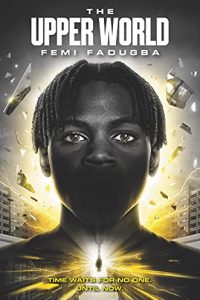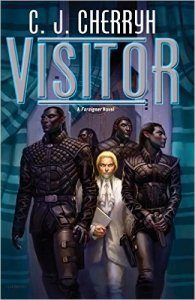Paul Di Filippo Reviews Break the Bodies, Haunt the Bones by Micah Dean Hicks
 Break the Bodies, Haunt the Bones, Micah Dean Hicks ((John Joseph Adams 978-1-328-56645-4, $24, 304pp, hardcover, February 2019)
Break the Bodies, Haunt the Bones, Micah Dean Hicks ((John Joseph Adams 978-1-328-56645-4, $24, 304pp, hardcover, February 2019)
Arguably, we live in a golden age for ghost stories, of an excellence and profusion on a par with the Victorian era classics. Writers such as Mike Carey, Thomas Olde Heuvelt, Tim Powers, and Paul Tremblay are working in this mode at the top of their game. As an article in the Guardian (where you can get some more leads for new work in this vein) opined a few years ago, “Not since the heyday of M.R. James and W.W. Jacobs has the ghost story been so in vogue.”
To this rich roster we can now add the debut novel from Micah Dean Hicks, a work which adds some sharp new riffs to the tradition. As the cover blurbs hint, Hicks adds some stefnal vibes to his tale, as well as topicality.
Our setting is a mid-size burg named Swine Hill. Like many places in the USA, it was once a flourishing and civically vital place, centered around the slaughterhouse-cum-packaging plant that processed mainly hogs. For generations this factory gave employment—however gritty and dangerous—to the citizens of Swine Hill. But now the town is decaying, emptying out fast. Part of this is due to the changing twenty-first-century economics that affect all such places. But the main reason for the exodus and entropy is ghosts. Swine Hill is experiencing a plague of spirits. They manifest visibly, tangibly, horribly. And they can possess a human, entering them and causing all sorts of psychic and physical manifestations.
Now, before delving into characters and plot, it should be mentioned that this outbreak of the dead is treated in a matter-of-fact, quotidian fashion. People continue, insofar as possible, with their daily routines. There is no media sensation, no intrusion of authorities and experts. There are no occult barriers around the town; people come and go as they please. So the atmosphere of the novel becomes akin to that of Delany’s Dhalgren with its city of Bellona both isolated from, yet still somehow connected to the outside world. Or, in a more subtle fashion, we are inhabiting a Ballardian landscape: an occult version of High-Rise or Super-Cannes or Concrete Beach, where the psychic miasma has caused a fracture in reality. Ballard’s version of this technique or trope never saw fit to use such tangible objective correlatives as ghosts—although something like The Drowned World comes close—but Hicks carries it off. I think passages like the one below indicate the JGB influence of desuetude and psychological malaise.
Henry wondered what Dennis had expected, his first image of the outside world drawn by pharmaceutical commercials, nature documentaries, and cartoons. Around the broken neighborhood, a sea of waist-high grass grew right up to the doors, leafy vines reaching up to pull down the walls of abandoned houses. Henry tried to find the beauty in it, but all he could see was the dull boredom of empty streets, the danger of dark windows.
Our central figures in the unfolding of the tragic downfall of Swine Hill will be one particular family, consisting of daughter Jane, a young adult; brother Henry, a teenager; and their mom and dad. The first three are all ghost-possessed. Jane’s ghost is the most benevolent, providing her with mind-reading abilities and advice. Henry’s ghost is a genius inventor who takes over the boy to craft bizarre devices under mental fugue conditions. (The house features a handy domestic robot that Henry built.) And mom’s spirit dweller renders her furnace-hot, so that to touch her is to get burned. Meanwhile, their zombified dad wanders the town, not possessed but with part of his mentality missing.
Add to the cast Jane’s potential boyfriend, Trigger, whose ghost has him exuding arctic cold, and Bethany, Henry’s classmate, a superhuman athlete urged on by the ghosts of all the failed sports types who ever lived in Swine Hill, and you have the troupe whose dynamics will drive the action. Oh yes, one more pair.
Henry’s latest project has involved not hardware, but bioware. Somehow, up at the meat plant, he (under possession) has genetically engineered a race of human-pig hybrids. Their leader is the Hogboss, with a son named Dennis. Having been newly gestated, the pig people have been hired by the corporation who runs the factory to replace all the human workers.
Having established all the elements of his bizarre landscape and its inhabitants, Hicks sets off one bomb after another. The interpersonal relations, contoured by the ghosts, warp and spin out of control. Jane wants to save Trigger from his ghost, but ends up destabilizing his whole family. Henry want to save Bethany from her curse, but only multiplies her problems with an alien infestation. Both children want to help their parents. And the presence of Hogboss and his “children” is driving the human populace to heights of fear and prejudice. The whole town is spinning out of control.
Hicks is merciless and relentless with these developments. Nothing is predictable, no one is safe. And while he adheres vividly and concretely to the strange metaphysics and physics of his conception, there is also an allegorical layer in which all of the sufferings of the populace can be interpreted as a representation of our current deranged media-sociopolitical-cultural terrain.
Hicks’s prose throughout the novel is beautifully and efficiently engineered, colorful and poetic while also blunt and harsh. He conveys all the major weirdness while at the same time never forgetting the core human emotional focus.
Trigger dropped the box on the ground. It pulsed with cold, making the ground beneath it tighten and crack. A warm wind blew out of the trees and through the clearing, dispersing the chill air. Jane touched Trigger’s shoulder, feeling heat in his skin.
“He left me,” Trigger said.
“Wind the key. Keep it playing.”
She used the heavy metal end of his flashlight to gouge out a hole in the spot where moments before the ground had been soaked with blood. Tiny roots crisscrossed like netting, making it slow and hard. She dug the hole as deep as she could. Beside her, Trigger unloaded his mind to her ghost, full of hope and fear.
Jane picked up the music box, wound its key one last time, and set it inside the hole. It was freezing to the touch, shocking her arm up to the shoulder. She kicked dirt back over the box and pressed the ground flat with her shoe.
“Come on.” She pulled Trigger away through the trees, following the flashlight’s tunnel of light. “In case it changes its mind.”
Trigger was in pieces. Sweat bled out on his neck and under his arms, wetting his back. He wasn’t used to heat. He was amped up, excited and free, but he was also angry. He didn’t like that she could keep secrets while knowing everything about him. He didn’t like that this choice had been hers instead of his.
Ultimately, surprisingly, yet not unauthentically with all the excruciations that have gone before, Hicks provides as close to a “happy ending” as anyone could, like a Marilyn Manson song segueing into a Bruce Springsteen lyric–but the Springsteen of “Born in the U.S.A.,” not “Rosalita.”
“Born down in a dead man’s town/The first kick I took was when I hit the ground/End up like a dog that’s been beat too much/Till you spend half your life just covering up.”
You will never forget the doings in Swine Hill, even after you’re dead.
 While you are here, please take a moment to support Locus with a one-time or recurring donation. We rely on reader donations to keep the magazine and site going, and would like to keep the site paywall free, but WE NEED YOUR FINANCIAL SUPPORT to continue quality coverage of the science fiction and fantasy field.
While you are here, please take a moment to support Locus with a one-time or recurring donation. We rely on reader donations to keep the magazine and site going, and would like to keep the site paywall free, but WE NEED YOUR FINANCIAL SUPPORT to continue quality coverage of the science fiction and fantasy field.







